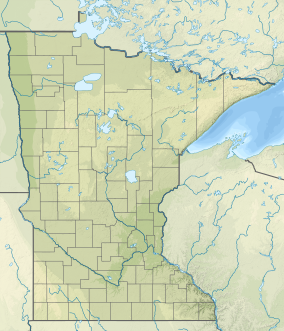Glacial Lakes State Park
| Glacial Lakes State Park | |
|---|---|
 Kettle lake and rolling hills in Glacial Lakes State Park | |
| Location | Pope, Minnesota, United States |
| Coordinates | 45°32′14″N 95°31′19″W / 45.53722°N 95.52194°W |
| Area | 2,423 acres (9.81 km2) |
| Elevation | 1,217 ft (371 m)[1] |
| Established | 1963 |
| Governing body | Minnesota Department of Natural Resources |
Glacial Lakes State Park is a state park of Minnesota, USA, approximately 5 miles (8.0 km) south of Starbuck. It was founded in 1963 to preserve some of the remaining rolling prairie which previously covered much of the state. Located in the Leaf Mountains, the park and the area around it contains many glacial landforms created by the Wisconsonian glaciation.
Biology and ecology
[edit]Flora
[edit]The park has many rare native plants. Prairie grasses and forbs that may be seen include big bluestem, little bluestem, Indian grass, prairie clover, pasque flowers, coneflowers and goldenrods. Wolfberry and rose shrubs are also in the park.[2]
Fauna
[edit]Due to its location in a transition zone between prairie in the west and hardwood forest to the east, prairie and woodland birds are found at the park. Squirrels, deer, beavers, wood ducks, raccoons, pileated woodpeckers and occasionally coyotes can be found.[2]
Recreation
[edit]Swimming, fishing and boating (only electric motors are allowed) are popular activities. At 56-acres, Signalness Lake is the largest body of water in the park and has a maximum depth of 13 ft. Fish include walleye, northern pike, bass, and panfish. Due to the shallow water, winterkill can partially affect the fish population and the DNR restocks fish.[3]
Snowshoeing, cross-country skiing, and snowmobiling are enjoyed during the winter.[4][5]
The remote location with low light pollution means stargazing is another popular activity.[6]
References
[edit]- ^ "Glacial Lakes State Park". Geographic Names Information System. United States Geological Survey. January 11, 1980. Archived from the original on September 26, 2022. Retrieved February 24, 2011.
- ^ a b "Glacial Lakes State Park: Park Information". dnr.state.mn.us. Minnesota DNR. Archived from the original on June 22, 2022. Retrieved September 26, 2022.
- ^ "Signalness (61014900) | LakeFinder". Minnesota Department of Natural Resources. Archived from the original on March 15, 2022. Retrieved September 26, 2022.
- ^ "Friends of Glacial Lakes State Park - Pope County, Minnesota USA - Park Trails". www.glaciallakesstateparkfriends.com. Archived from the original on March 20, 2014. Retrieved March 20, 2014.
- ^ "Snow Depth and Groomed Trail Conditions for Glacial Lake State Park". Minnesota Department of Natural Resources. Archived from the original on March 10, 2022. Retrieved September 26, 2022.
- ^ "Home". Archived from the original on October 13, 2014. Retrieved March 20, 2014.
External links
[edit]- Glacial Lakes State Park
- "Minnesota Conservation Volunteer" snapshot of the park Archived April 15, 2015, at the Wayback Machine


